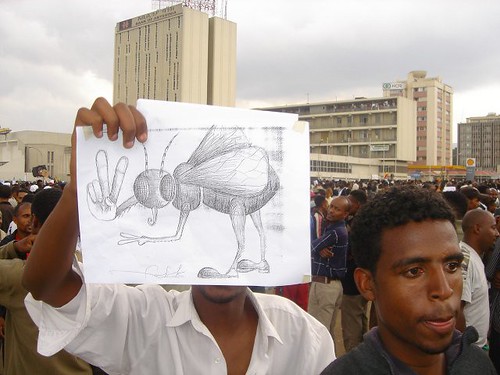Pacific News Service -- The Ethiopian immigrant community in the United States has been protesting the mass detentions and killings of unarmed civilians by the Ethiopian Regime in the continuing post-election violence.
Ethiopians have mounted a concerted political initiative - holding a series of demonstrations in major cities, writing and calling elected representatives and the Bush administration to make them aware of the atrocities. We have repeatedly requested the suspension of the hundreds of millions of aid dollars for the Ethiopian regime. The money the U.S. gives the regime in Ethiopia in the guise of fighting terrorism is being used to gun down Ethiopians and extend the life of an autocratic regime rejected by the people of Ethiopia in the May 2005 elections.
The result of these efforts have been mixed. The White House and the State Department have ignored the plea from the Ethiopian immigrant community.
On the other hand, many Republican legislators have responded positively or have been willing to listen to their constituents.
Chairman of the House Subcommittee on Africa, Global Human Rights, and International Operation, Republican Congressman Chris Smith has authored the Ethiopia Consolidation Act or HR4423. If it passes, the bill will hold the government of Ethiopia accountable for the billions of aid money by tying aid to commitment to democracy and the rule of law. The bill has wide support among House Republicans.
In contrast, the response from Democratic members of the Subcommittee on Africa has been disappointing.
Some members like Congressman Donald Payne, the ranking Democrat on the subcommittee have shown outright hostility towards the bill. HR4423 was withdrawn at the last minute from its Feb. 28 markup date because of lack of support from the Democrats. Congressman Payne claimed at the last minute that the bill required more discussion and it was withdrawn.
Considered to be an expert on Sub-Sahara Africa, Congressman Payne has refused to meet with his Ethiopian-American constituents in the New Jersey area.
Ethiopian constituents have similarly failed in attempts to gain the support of key Democrats on the subcommittee including Congresswomen Diane Watson and Barbara Lee.
The Ethiopian Government is spending millions on five large lobby groups and public relations firms. Is this lobbying bearing fruit in the foot dragging of the Democrats in the subcommittee on Africa?
The spending of millions of dollars for high powered lobbyists by a poverty stricken country like Ethiopia whose national budget is supplemented by Western nations is in itself astonishing.
The performance of the Ethiopian Caucus (all Democrats) needs to be scrutinized as well. What is the position of the Ethiopian Caucus on HR4423 and on the atrocities that have been committed in Ethiopia after the aftermath of the May 2005 election?
What about members of the Black Caucus? Why were the Democrats, and members of the Subcommittee, Ethiopian Caucus, and Black Caucus, not present at any of the demonstrations staged in Washington D.C. and all over the United States?
Democrats, who claim to be the party of the people, and speak for the down trodden and oppressed, should have stood alongside their constituents. Renowned civil right leaders like Dr. Joseph Lowery of the People's Agenda were present and condemned the injustice being perpetrated against the people of Ethiopia.
The Ethiopian immigrant community has to show its strength during the upcoming mid-term and 2008 elections. The estimated half a million or so Ethiopian immigrants have been increasingly naturalized as U.S. citizens in the last decade. Every remaining eligible Ethiopian immigrant has to consider naturalizing to be able to vote in the upcoming elections. Naturalized Ethiopian immigrants have to seriously reconsider their natural alliance with the Democratic Party and register as independents, and ensure that they vote for those, be it Republican or Democrat, who have shown a track record of listening to their constituents.
In addition to voting, Ethiopian immigrants must be active participants in the upcoming midterm and 2008 elections by working in the campaigns of candidates that are willing to listen to their constituents. The community needs to participate in get-out-the-vote drives, volunteer to work on phone banks, etc.
It is time that the Ethiopian immigrant community is taken seriously by the political establishment in the United States. The only way it will be taken into account as a viable community is when it gets respect as a community. The Ethiopian immigrant community can earn this respect by getting involved in the U.S. political process in such a way that its voice will have an impact.
Previous Post:
Reverend J. Lowery to Address Rally for Democracy in Ethiopia
Fo-to:
Check out Ethiopian Review's Anti-Meles Rally Photos

No comments:
Post a Comment